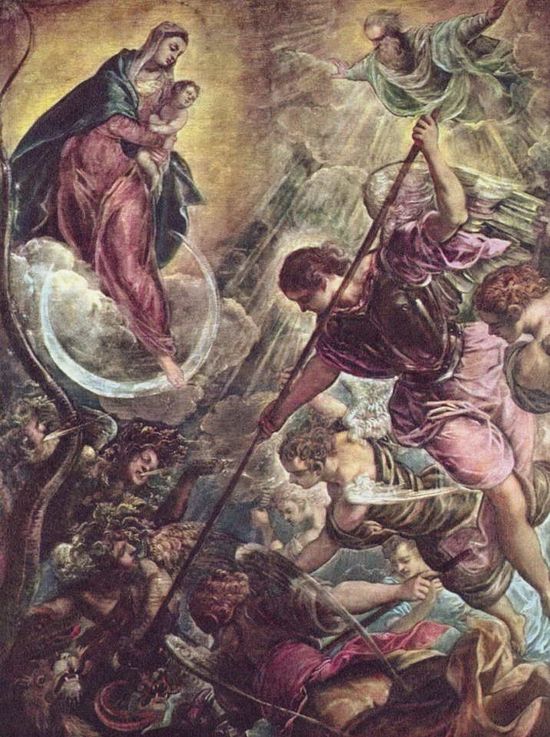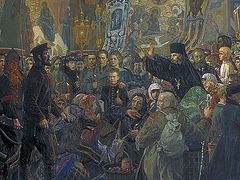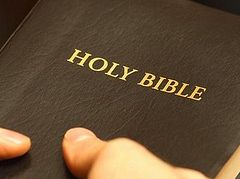 Battle of the Archangel Michael and the Satan. Artist: Tintoretto (Jacopo Robusti). Photo: wikiart.org
Battle of the Archangel Michael and the Satan. Artist: Tintoretto (Jacopo Robusti). Photo: wikiart.org The tenth chapter of Daniel records the prophet’s final vision, one that contains a very interesting tale:
Now on the twenty-fourth day of the first month, as I was by the side of the great river, that is, the Tigris, I lifted my eyes and looked, and behold, a certain man clothed in linen, whose waist was girded with gold of Uphaz! His body was like beryl, his face like the appearance of lightning, his eyes like torches of fire, his arms and feet like burnished bronze in color, and the sound of his words like the voice of a multitude. And I, Daniel, alone saw the vision, for the men who were with me did not see the vision; but a great terror fell upon them, so that they fled to hide themselves. Therefore I was left alone when I saw this great vision, and no strength remained in me; for my vigor was turned to frailty in me, and I retained no strength.
Yet I heard the sound of his words; and while I heard the sound of his words I was in a deep sleep on my face, with my face to the ground. Suddenly, a hand touched me, which made me tremble on my knees and on the palms of my hands.
And he said to me, “O Daniel, man greatly beloved, understand the words that I speak to you, and stand upright, for I have now been sent to you.” While he was speaking this word to me, I stood trembling.
Then he said to me, “Do not fear, Daniel, for from the first day that you set your heart to understand, and to humble yourself before your God, your words were heard; and I have come because of your words. But the prince of the kingdom of Persia withstood me twenty-one days; and behold, Michael, one of the chief princes, came to help me, for I had been left alone there with the kings of Persia. Now I have come to make you understand what will happen to your people in the latter days, for the vision refers to many days yet to come.” (Dan 10:4-14)
Daniel is clearly being spoken to by a heavenly messenger (who is probably the Archangel Gabriel based on Daniel’s earlier visions). Oddly, the angel had trouble getting to Daniel and was delayed in his journey (for 21 days). He explains the reason for the delay: “the prince of the kingdom of Persia withstood me….” This “prince” is not a reference to any earthly being. It is not a political figure in Persia. It is, instead, a spiritual figure, along the lines of an angel, that has fought against the messenger and tried to prevent him from reaching Daniel.
And the story gets more interesting. The delayed angel gets assistance. Michael, “one of the chief princes,” came to help in the battle. With his assistance, the messenger manages to complete his assignment.
Daniel is giving us a description of a “behind the scenes” battle that accompanied his prayer. It also points us to a role played by what the New Testament describes as “principalities and powers.” On a human level, we see nations as political entities. In Daniel, they are but reflections of spiritual realities, not all of which are friendly or on the side of God. This aspect of things is brought into even greater relief when we read a little later:
Then he [the angelic messenger] said, “Do you know why I have come to you? And now I must return to fight with the prince of Persia; and when I have gone forth, indeed the prince of Greece will come. But I will tell you what is noted in the Scripture of Truth. (No one upholds me against these, except Michael your prince.)(Dan 10:20-21)
The angel is describing a great battle taking place. He is fighting with the “prince” of Persia, but says that the “prince of Greece” will come. In history, this occurs a couple of hundred years after the conversation with Daniel. The earthly reflection of this battle is fulfilled in the coming of Alexander the Great, who conquers Persia. But this conversation intimates that the real struggle had already begun on the level of the heavens. He also notes that the only help he is getting in this cosmic struggle comes from “Michael your prince.”
St. Paul, in his letter to the Ephesians, says:
For we do not wrestle against flesh and blood, but against principalities, against powers, against the rulers of the darkness of this age, against spiritual hosts of wickedness in the heavenly places. (Eph. 6:12)
He also makes an allusion to this aspect of reality in 1 Cor.:
Howbeit we speak wisdom among them that are perfect: yet not the wisdom of this world, nor of the princes of this world, that come to nought: But we speak the wisdom of God in a mystery, even the hidden wisdom, which God ordained before the world unto our glory: Which none of the princes of this world knew: for had they known it, they would not have crucified the Lord of glory. (1 Cor. 2:6-8)
“Princes” here does not mean anything earthly. It is the demonic powers who crucified the Lord of glory.
Of note, for me, is the connection between political entities and the principalities. St. Michael is the “Captain of the Lord’s Army,” and is described as “your prince,” meaning, “Israel’s holy protector.” The Orthodox Church addresses him as “Chief Captain of the Bodiless Hosts.”
The modern world has drawn its populations deeply into the matrix of political existence. Prior to the rise of the nation states in the 18th century, the world was generally divided among various monarchies. Territories and peoples often shifted (and life carried on with prayers for tax relief and justice). Only on occasion would a population be drawn into the fever of ethnic identity and loyalty to a ruler. Armies were often hired mercenaries. Nation states, described as democracies, have made the political notion of a nation identical with the people who live in that nation. We are told that “we” are the government and that the army (etc.) fights for “us.”
If we stand back a moment and look at our world from the perspective shown in Daniel, we will understand that the “we” in a nation’s life includes something “off-world” as well. There is something not-so-nice behind many of the machinations of the “earthly” powers. The exact nature of their role is not given to us, but it remains.
One author, exploring this topic, compared the principalities and powers (of this world), to the “garments of skin” in Genesis. The fathers often saw in those garments an expression of God’s provisional arrangement of our life. The man and the woman have been expelled from paradise, but still need protection in this world. The covering they get is the product of a killing. It is not the covering we long for (the righteousness of Christ, sometimes called the “garment of light”). Among the garments of skin are the civil arrangements of our world. The laws protect us (or should), but they cannot save us, make us better people, or bring forward the Kingdom of God. They are useful but lack true goodness. As such, they are, more or less, “necessary evils” or, at best, “permitted less-than-good things.”
This “ruling” aspect of the principalities and powers is clearly a part of the New Testament understanding of the world. Christ tells Pontius Pilate that he would have no power over Him if it hadn’t been given to him from above. But Paul clarifies this. The “powers” acting in and through Pilate are not the Imperial ones in Rome. They are the “princes of this world.” They clearly have their limits. Their darkness can sometimes descend into our midst and reveal just how unholy they are in their intents. They love murder. Where death is rampant, you can be sure of their presence. If the evil of Hitler’s Germany seems more than human, you are right. It was demonic. The prince of Germany unleashed hell on earth.
There is a character to these princes, and they even seem to war among themselves (for reasons we do not know or understand). St. Paul notes that we have a role in that warfare ourselves. Our warfare is not the earthly form that appears in the merely political realm. Our true warfare is to intercede as Daniel did through every means given to us.
An important insight within all of this is that what we ourselves see is not the full extent of the story. Human history is not entirely human. When Pilate questions Christ, he assumes that he is a key player in a human drama. But the true drama is being acted out in the heavens. The entire cosmos surrounds what happens on Golgotha. Our daily lives are no less intertwined in the business of the heavens.
This unmasks the foolishness of modern thought. We have reduced our world to the merely secular, presuming that we ourselves are the driving force of history and that the outcome of things is in our hands. The Church, however, has its “citizenship” in heaven (Phil. 3:20). Actions that might seem out-of-the-way in the light of secular history have more to do with reality than is realized. The offering of the Bloodless Sacrifice at the altar in even the smallest congregation carries more eternal weight in heaven than all the votes cast by men. The outcome of history in Sodom and Gomorrah turned on the possible presence of but ten righteous persons.
We should remember to live lives that matter. Pray. Forgive. Repent. Intercede. Confess. Commune. The Lord sustains the universe through the prayers of the faithful.




